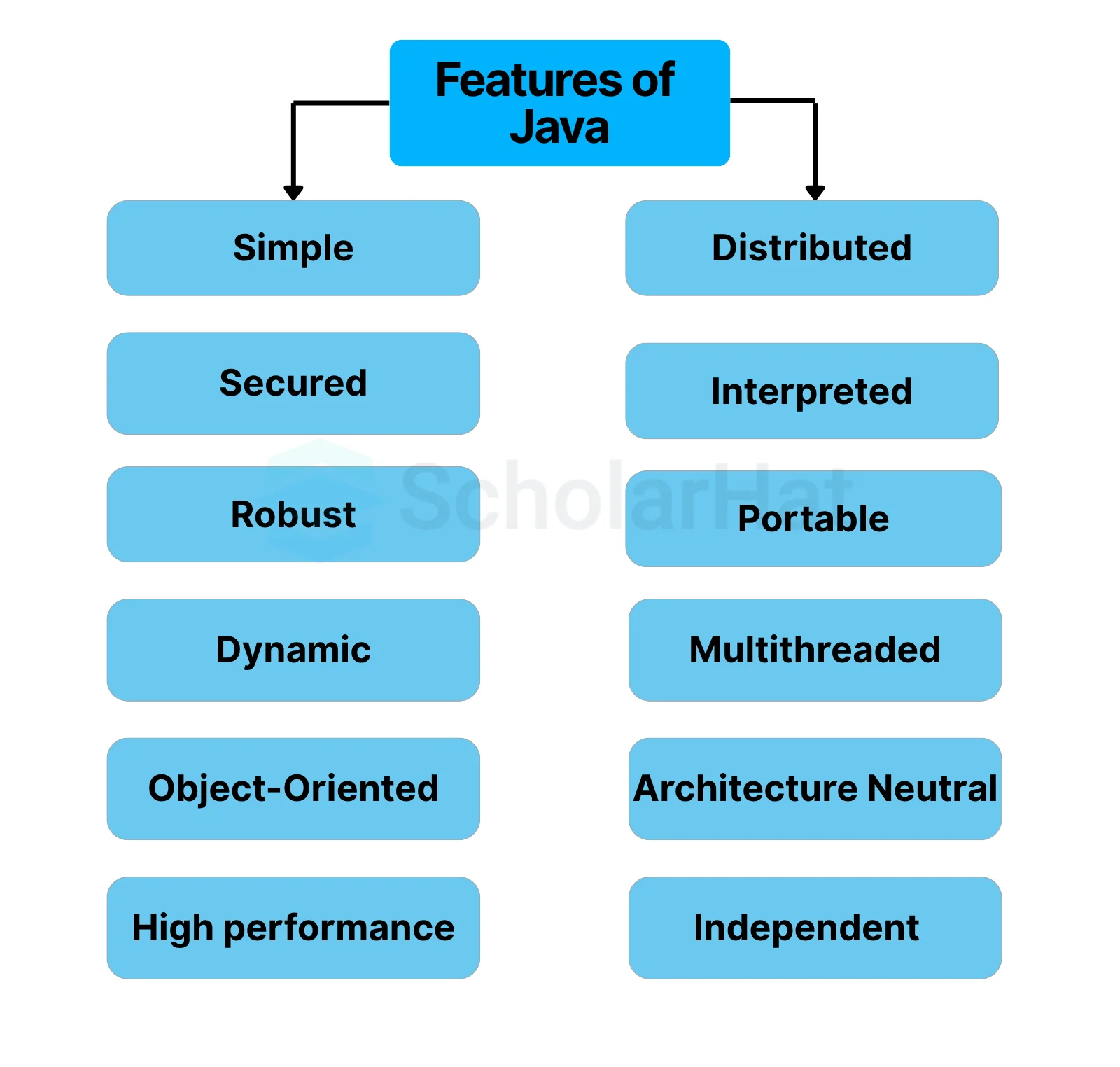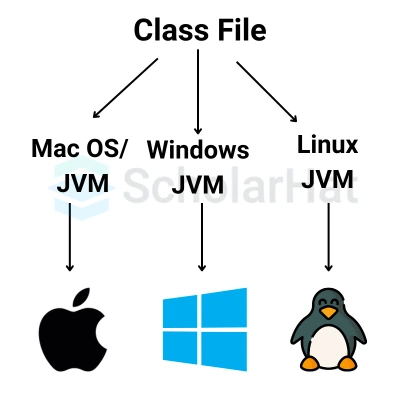Top 12 Features of Java
Java features itself as the backbone of Java. Java, a programming language, is known for its simplicity, flexibility, and robust functionality. It was developed to be user-friendly while delivering performance and compatibility across platforms. Whether you're building a simple app or a complex system, Java has something to offer called its features. Let's explore the features of Java that contribute to Java's adoption by developers worldwide.
In this Java tutorial, we will learn some top Features of Java, such as Simple, Object-Oriented, Portable, Platform-independent and so on. 70% of entry-level developers lack core Java skills. Build your foundation today with our no-cost course. Join the Free Java Course Today!!
Top features of the Java language
Below is a list of the key features of the Java programming language
- Simple
- Object-Oriented
- Portable
- Platform independent
- Secured
- Robust
- Architecture neutral
- Interpreted
- High Performance
- Multithreaded
- Distributed
- Dynamic

1. Simple
- Java is user-friendly.
- Its syntax is clear and concise, making it suitable for both aspiring programmers and experienced professionals.
- By omitting features like pointers and operator overloading seen in languages Java minimizes errors and improves code readability.
- Furthermore, Java includes a library that streamlines various common programming tasks.
- One of the beginner-friendly features of Java is its easy-to-learn and familiar syntax.
Fundamentally object-oriented Java revolves around the concept of objects and classes. This design fosters the creation of reusable and maintainable code. The object-oriented features of Java support modular and maintainable code development
OOP Concepts:
| Read More: Single Inheritance in Java, Hierarchical Inheritance in Java |
3. Portable
- Java's portability is one of its biggest benefits.
- Programs written in Java are compiled into bytecode, which a Java Virtual Machine (JVM) can run on any platform.
- This makes Java an excellent option for cross-platform development.
- Since Java code written on one platform can execute unchanged on any other platform that supports JVM.
- Portability is one of the strong features of Java, enabling code to run across different platforms without changes
| Read More: Differences between JDK, JRE, and JVM: Java Toolkit |
4. Platform Independent
Java is platform-independent because Java is a write-once, run-anywhere language, unlike other languages like C, C++, etc., which are compiled into platform-specific machines. The software or hardware environment that a program operates in is called a platform. One of the key features of Java is its ability to run on any device with a Java Virtual Machine (JVM).

There are two types of Platforms
- Hardware-based
- Software-based.
Java offers a software-based platform. Being a software-based platform that consists of two parts:
- API (Application Programming Interface)
- Runtime Environment
Numerous operating systems, including Windows, Linux, Sun Solaris, Mac/OS, and others, can run Java code. The compiler compiles and transforms Java code into bytecode. This code is platform-neutral bytecode.
5. Focuses on Security
- Security is an aspect of Java's design.
- The language was crafted with security as a priority, incorporating features such as bytecode verification, secure class loading, and a robust security manager that sets access controls for Java classes.
- These measures serve to safeguard against code and unauthorized access, establishing Java as a choice for building secure applications.
- Security is one of the core features of Java, making it suitable for network-based applications
Security is the main reason for Java's fame. We can create virus-free systems using Java. Java is safe because of the following two factors :
- No explicit pointer
- Java Programs run inside a virtual machine sandbox
- ClassLoader: In Java, the Classloader is a component of the Java Runtime Environment that dynamically loads Java classes into the Java Virtual Machine. It enhances security by segregating file system class packages from those obtained from network sources.
- Bytecode Verifier: The Bytecode Verifier scans code fragments for code that could breach object access rights.
- Security Manager: The Security Manager controls a class's access to resources like reading and writing to the disk.
Java inherently includes these security features. Additionally, developers can implement security measures such as SSL, JAAS, and Cryptography.
6. Robust- Reliability at Its Core
- Java is renowned for its reliability and robust nature.
- The language places emphasis on error detection, runtime checks, and efficient memory management.
- Elements like exception handling, garbage collection, and type validation during both the compilation and execution phases contribute to Java's capacity to develop error-free applications.
- Strong memory management in Java helps prevent issues like memory leaks from occurring.
- The robust features of Java help in building error-free and reliable
7. Architecture Neutral
- Java is known for its architecture nature, meaning that Java applications are not limited to a processor or hardware design.
- This adaptability is made possible by Java bytecode, which is interpreted by the Java Virtual Machine (JVM) on any hardware platform.
- This unique aspect enables Java applications to run seamlessly across environments without the need for modifications.
8. Interpreted
- In terms of execution, Java programs undergo both compilation and interpretation processes.
- The source code is first compiled into bytecode by the Java compiler.
- Then, this bytecode is interpreted by the JVM when the program runs.
- This dual approach provides flexibility and efficiency allowing for program execution and supporting features like Just In Time (JIT) compilation, which optimizes performance by converting bytecode into machine code during runtime.
9. High Performance
- Java achieves performance levels through optimization techniques.
- JIT compilation plays a role in enhancing execution speed by converting bytecode into machine code on the fly.
- Furthermore, the JVM implements runtime optimizations such as method inlining and adaptive optimization to further boost the performance of Java applications.
- While historically considered slower compared to languages like C++, Java has made performance advancements over time.
- Features of Java offer performance through Just-In-Time compilers, making it efficient.
10. Multithreaded
- The concept of multithreading stands out as a feature of Java, enabling the execution of multiple threads within a program.
- To support multithreading Java includes built-in features, like the java.lang.
- Thread class and java.util.concurrent package.
- The multithreading features of Java allow concurrent execution for better performance.
11. Distributed
- Developers can utilize Java to create high-performance applications for handling multiple tasks simultaneously.
- This makes Java well-suited for crafting real-time applications, like web servers and multimedia software.
12. Dynamic
One dynamic language is Java. It allows classes to load dynamically. It indicates that courses are added as needed. Additionally, it supports functions from C and C++, which are its native languages.
Conclusion
Java's range of features establishes it as a robust programming language. Its user design, object-oriented approach, cross-platform compatibility, security measures, resilience, and speed have cemented its status as a language among developers in various fields.
Full-stack Java roles are growing 40% faster than traditional coding jobs. Don’t miss out—enroll now! Java Full Stack Course.
| Similar Articles on Java |
| For Loop in Java: Its Types and Examples |
| Best Java Developer Roadmap 2024 |
Test your knowledge: Are you ready to challenge yourself and ace this quiz?
Q 1: Which feature makes Java platform-independent?
FAQs
Take our Java skill challenge to evaluate yourself!

In less than 5 minutes, with our skill challenge, you can identify your knowledge gaps and strengths in a given skill.










